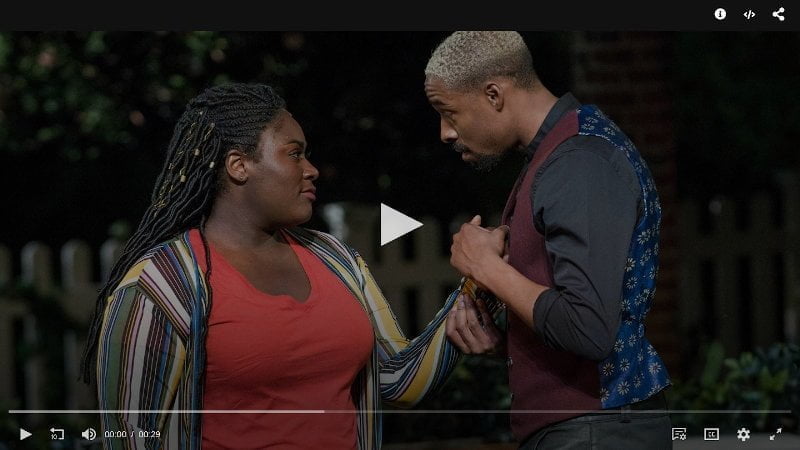
Knowledge graphs are tricky beasts to create. Trying to extract semantic metadata from documents is a gargantuan task. Mix them together and you have a recipe for disaster. While yak-shaving for my MSc, I found an interesting looking research paper authored by one JC Shakespeare. As you can probably tell from that snippet, there is something a bit hinkey going on here. Here's the page that Google Scholar has scraped: It's pretty easy to see what has happened here. The algorithm (whether …
Continue reading →

About five minutes into the show I already had tears of laughter streaming down my face. I didn't stop laughing and squealing with delight until the curtain call. The plot - unusual for a jukebox musical - is relatively well thought through. What if Juliet didn't die at the end of Romeo + Juliet? What if she left Verona to seek her heart's desire? And, much like a Shakespeare comedy, there's no shortage of star-cross'd lovers, puns, intense queerness, and ridiculous Frenchmen. There's also a…
Continue reading →

This is selection of essays looking - as the title suggests - at the relationship between Shakespeare and immigration. It's always worth re-examining our relationship with "classic" works. There are some very obvious immigration issues in Shakespeare - and this book does a plausible job of uncovering some of them. It also takes us through some of the issues facing Elizabethan England - for example, how the Welsh "immigrants" were treated by the "native" London population, and how that…
Continue reading →

Ira Aldridge -- a black New Yorker -- was one of nineteenth-century Europe's greatest actors. By the time he began touring in Europe he was principally a Shakespearean actor, playing such classic characters as Shylock, Macbeth, Richard III, and King Lear. Although his frequent public appearances made him the most visible black man in the world by mid-nineteenth century, today Aldridge tends to be a forgotten figure, seldom mentioned in histories of British and European theater. This…
Continue reading →

Does the world need yet another film of Macbeth? And this one doesn't even have a shtick like setting it in a space station. And - to make matters worse - it's filmed in black and white, with a 4:3 aspect ratio. What is this, the Snyder cut?!?! And yet… it is perfect. Joel Coen's direction shows exactly what can be accomplished with a set that looks like it is out of a 1960s BBC dramatisation. Sure, there are little touches of CGI here and there, but he demonstrates that he is at the peak of h…
Continue reading →

The Cambridge Companion to Shakespeare and Race shows teachers and students how and why Shakespeare and race are inseparable. Moving well beyond Othello, the collection invites the reader to understand racialized discourses, rhetoric, and performances in all of Shakespeare's plays, including the comedies and histories. Race is presented through an intersectional approach with chapters that focus on the concepts of sexuality, lineage, nationality, and globalization. The collection helps…
Continue reading →

It is Thursday, 19 Mar 1998, 11:35 and I've bunked off school. I'm about to be on TV. I don't think I've told anyone. A few months prior, I had auditioned for a TV show and got the part! A few days later - with school's permission - I started rehearsals in some weird BBC rehearsal space. At the end of the week, a car took me to the then-abandoned St Pancras hotel, where we filmed. The resulting programme was... fine. I guess. I've written more about my experiences - but I never saw the show…
Continue reading →

For a blog called "shkspr.mobi", I don't blog enough about Shakespeare. Sorry! The brilliant thing about Shakespeare is its versatility. You can do almost anything with it. Mess around with genders, set it in space, make a puppet show. It all just works. Perhaps you've seen a gender-flipped version of one of the minor history plays set in Wales against the Miners' Strike and it was proper theatre. Or maybe you only ever watch all-male casts from the groundlings to see what it was really…
Continue reading →

So much of what we say about Shakespeare is either not true, or just not relevant, deflecting us from investigating the challenges of his inconsistencies and flaws. This electrifying new book thrives on revealing, not resolving, the ambiguities of Shakespeare's plays and their changing topicality. A joyous read in these troubling times. A series of essays on Shakespeare from one of the UK's leading experts. At times, this feels like having a "Director's Commentary" on your favourite plays.…
Continue reading →

For a domain based on Shakespeare - this blog doesn't talk about The Bard much. Sorry! I forced a bot to read 154 Shakespearean Sonnets. This is what it came up with... 47 Be where thou art, thou art the sea, Till all that belongs to it turn aside, And make another land into thy heart's plot. Let those elements that should guide thy march, Make thee thy ward against the sea's cruel gale! The deep shall not hold thee afloat, The deep shall…
Continue reading →

Eight years ago, I released an open source database of Shakespeare's plays. Yesterday, it received its first Pull Request! I'm playing the long game... This led me down a curious little rabbit-hole. Which characters appear in Shakespeare's plays - but have nothing to say? The Pull Request looked at the characters mentioned in the Dramatis Personae and correlated them with the characters with spoken lines in the play. Here's what it found. Henry IV, Part 2 Poor old Sir John Blunt. He gets…
Continue reading →

This weekend, I spotted that a person I know was running a Shakespeare themed GameJam - a sort of informal collection/competition arranged around a theme. The Shakespeare #BardJam ends midnight BST tonight, & works-in-progress are welcome. https://itch.io/jam/bard-jam #interactivefiction #textgame — Ash (@ggnewed) April 30, 2016 Given my previous experience developing Interactive Fiction, I figured I'd spend my Saturday building a simple game. So, here - literally hours in the making - I p…
Continue reading →










